1993-2002: Time for technology
02 / 08 / 2023
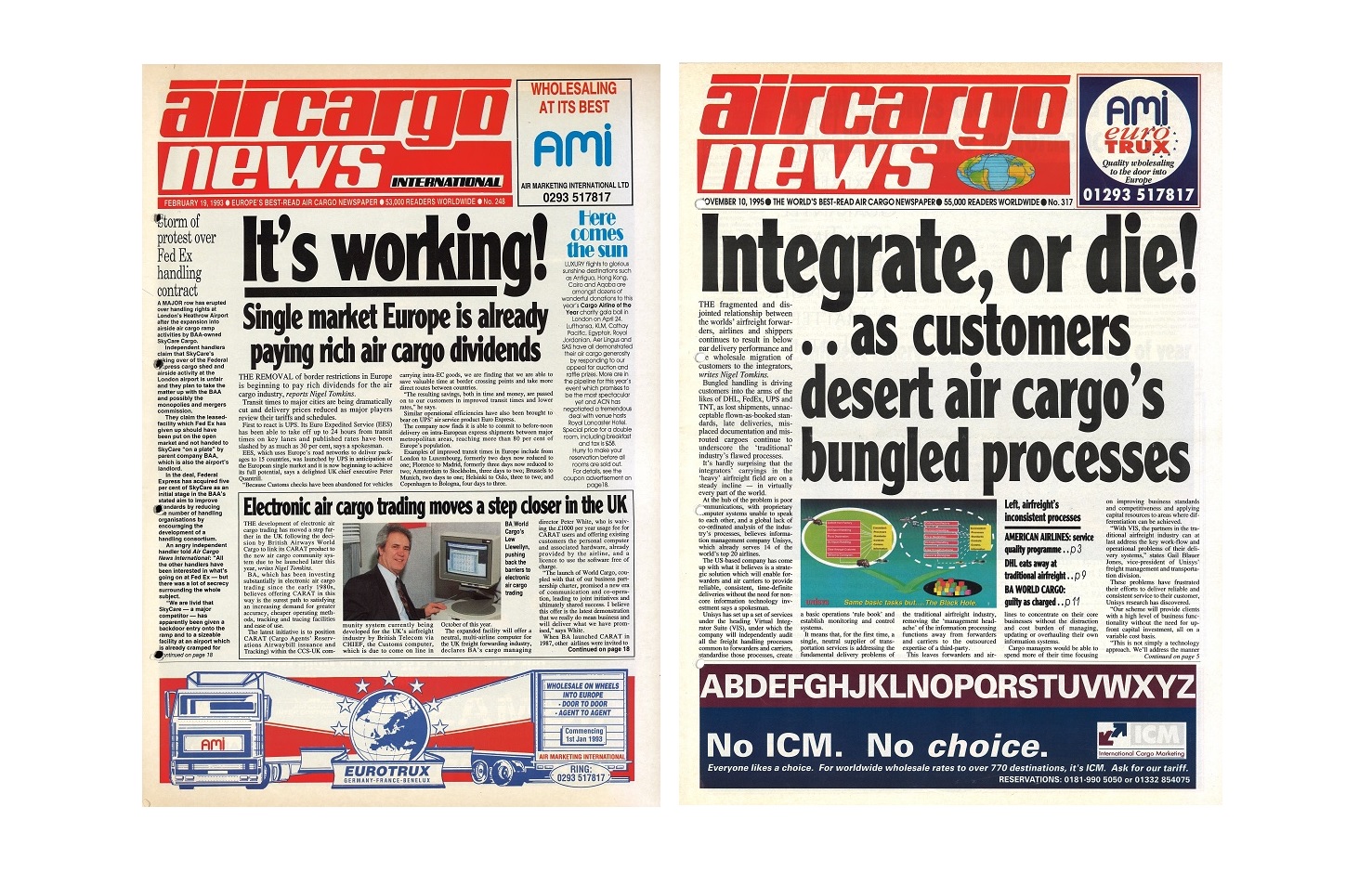
As the 1990s progressed, the rapid growth of the internet began to have a big influence on air cargo. The industry also faced a power struggle with the rise of the integrators – and had to cope with some tragic events.
The years 1993-2002 saw the deployment of internet and digital technology pick up the pace
in the air cargo industry and
there was also much focus on the power dynamic between integrators, freight forwarders and airlines – with ongoing concerns that integrators were grabbing market share.
The pages of Air Cargo News International (ACNI), which changed its name to Air Cargo News (ACN) in March 1994, were also awash with new aircraft developments and acquisition stories.
1993
One of the biggest focus points in 1993 was the establishment of the European Union (EU) single market in January, which was hailed as a success for air cargo.
ACNI’s February 19 front-page story, headlined “It’s working! Single market Europe is already paying rich air cargo dividends”, reported that a review of tariffs and schedules had prompted a reduction of prices and transit times to major cities.
Later that year, the EU was officially created by the Maastricht Treaty, which came into force in November to offer more fluidity and efficiency, albeit with more red tape to navigate, for the industry.
The biggest aircraft news of the year came in June, when the first Boeing 747-400 freighter took flight as part of a three-month flight-test programme, carrying more cargo (122 tonnes) and travelling further than any previous commercial freighter model.
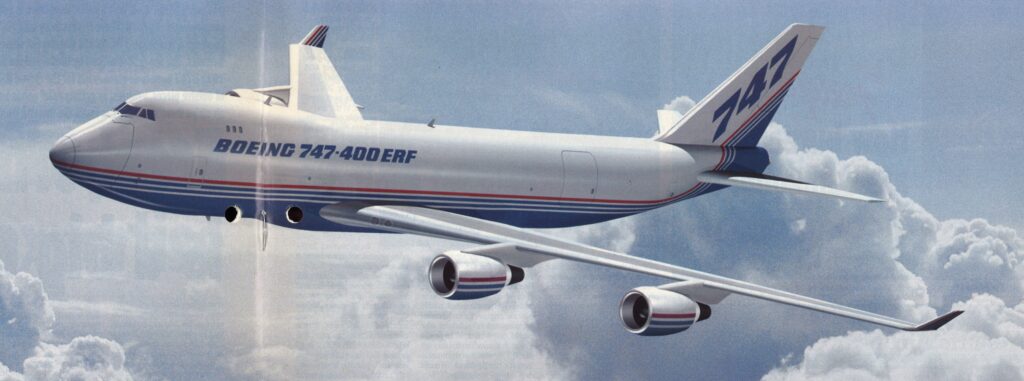
First Boeing 747-400ER freighter
This year also saw ACMI lessor Atlas Air secure China Airlines as its first customer, with scheduled 747-200F services between Taiwan and Europe. Polar Air Cargo also launched in April with services from the US to Australia, Europe and Asia using three leased 747-100Fs.
And in July, UK freight wholesalers Menzies Worldwide Distribution and Air Marketing International were merged to form what would remain a major market player, Air
Menzies International.
1994
1994 started with a reminder of how volatile the industry could be when dozens of companies lost money following the collapse of wholesale courier company First European, after Air Menzies International successfully brought legal action against the business, allegedly because its directors broke a covenant not to compete. Then in May there was an airfreight milestone, with the launch of the first Airbus dedicated freighter, the A300-600F.
Developed for US integrator FedEx Express, theA300-600F could carry about 50 tonnes over 5,000
km. FedEx placed firm orders for 25 of the aircraft in 1991, and these were delivered over a five-year period.
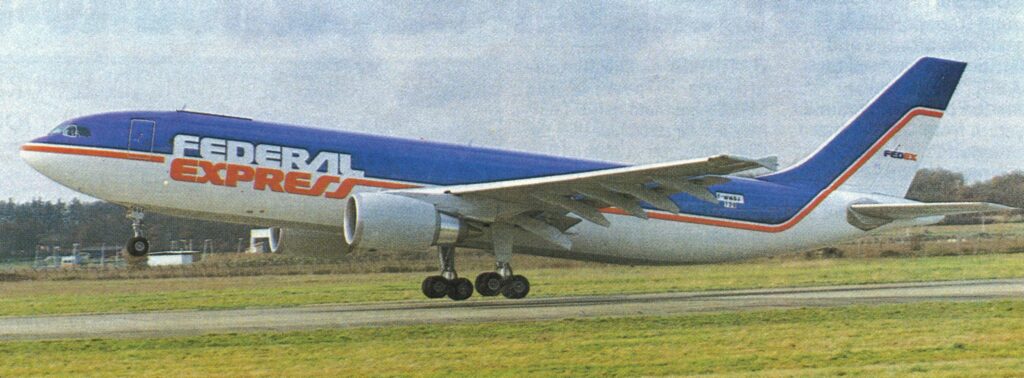
First Airbus dedicated freighter
Then, one of the most notable acquisitions of the year came in April when Cathay Pacific strengthened its market position by purchasing 75% of the shares of rival cargo carrier Air Hong Kong, which was 80% owned by Shun Tak Holdings.
Elsewhere, post-Cold War economic ties were formed when Russian cargo airline VolgaDnepr Airlines received approval and certification to begin scheduled and charter cargo operations between Russia and the US.
1995
The neighbouring Ukrainian Antonov Airlines suffered a blow in early 1995 when the AN-70T freighter prototype was destroyed in a crash during flight testing in Kyiv.
A casualty of a different kind was confirmed in March with the collapse of US freight forwarder Dateline Forwarding.
Its UK associate company Dateline Forwarding Services was taken over by US forwarder Air Express International (AEI), which subsequently acquired Brantford International from FW Terminals in August.
In a nod to future environmental concerns, Frankfurt Airport faced having its volumes curtailed when in July the German government proposed a night-time ban on aircraft, including 747-200Fs. However, night flights turned out to be protected for another 15 years – until a ban was eventually put in place in 2011.
Following on from the first Airbus freighter the previous year, 1995 saw Boeing’s first 767 freighter delivered to US integrator giant UPS. The logistics company had ordered 30 of the aircraft type in 1993 and subsequently secured options for 30 more.
1995 also saw the industry become concerned about integrators winning shippers’ business from airlines and freight forwarders, with ACN reporting that stakeholders believed this was because of a fragmented and disjointed relationship between forwarders, airlines and shippers.
1996
1996 began with a bang when US-based freight forwarder Circle International acquired fellow US forwarder Celadon Jacky Maeder for $21m.
Elsewhere, KLM was rocked with controversy over its alleged practice of bypassing freight forwarders to do deals directly with shippers.
In a front-page exclusive in February, ACN wrote forwarders threatened to boycott the Dutch airline, but the following month KLM denied this and was resolute in continuing dialogue with shippers but “not
cutting out the forwarder”.
Then the debate over how much influence integrators had in the industry was further fuelled in March, when UPS claimed that integrators did not pose a threat to freight forwarders and weren’t trying to force them out of business, ACN reported.
1996 was also an instrumental year for electronic documentation. In March IATA urged governments to sign the ‘Montreal Protocol No 4’ and end the use of the paper air waybill to reduce costs and inefficiencies.
And perhaps the first cargo capacity to become available on the World Wide Web came in the form of the ‘Cargo Online’ wholesale platform with searchable cargo charter flights and cargo capacity, as reported by ACN in October.
1997
Ground handlers faced a challenge in 1997 when the EU introduced a directive to liberalise ground handling at airports and shake up price competition – but it was good news for airlines.
Applicable from October 1997, the directive meant more ground handlers were able to enter the market, ending the monopoly for airports providing this service, wrote ACN with its March headline ‘Ground handling free for all leads to price war at airports’.
But the industry demonstrated it could be better together in May when IATA interest group Cargo 2000 launched to shorten delivery times, improve customer service and lower costs, with 12 global forwarders and 18 airlines taking part.
ACN reported in April that the industry began increasing its use of the internet with the goal of offering track-and-trace shipment services for shippers.
But as well as offering new benefits, the adoption and integration of the internet into airfreight operations proved to be a pain point into the late 1990s as fears about the so-called “Millennium Bug” began to grow.
For example, ACN wrote in December that DHL planned to spend $25m to protect its hardware and software from the possibility of its computer systems failing as the new century begun.
1998
By April 1998, IT experts again predicted that the Millennium Bug would crash systems and cost billions in damage and lost revenue. Companies were faced with reappraising all their computer systems.
It was also a boom year for Circle. The company took over Concord Express Singapore and CE Logistics, renamed Circle Concord International, in June. The following month it purchased Concord Express UK, and then US freight forwarder Alrod was brought in August.
However, US supplemental cargo airline Southern Air Transport (SAT) didn’t fare so well. The business folded in October following 50 years in operation, after attempts to sell the firm to a number of companies, including Atlas Air, Fine Air, and Kitty Hawk, failed.
Major aircraft innovations of the year included the emergence of plans for the ill-fated Airbus A3XX triple-decker freighter, which would eventually become the A380 freighter that was never built.
With a payload capacity of 150 tonnes, there was much excitement about the freighter, but in the following years orders were cancelled by FedEx and UPS, and converted to A380-800 passenger aircraft by Emirates and International Lease Finance Corporation (ILFC). Airbus subsequently scrapped its plan for production.
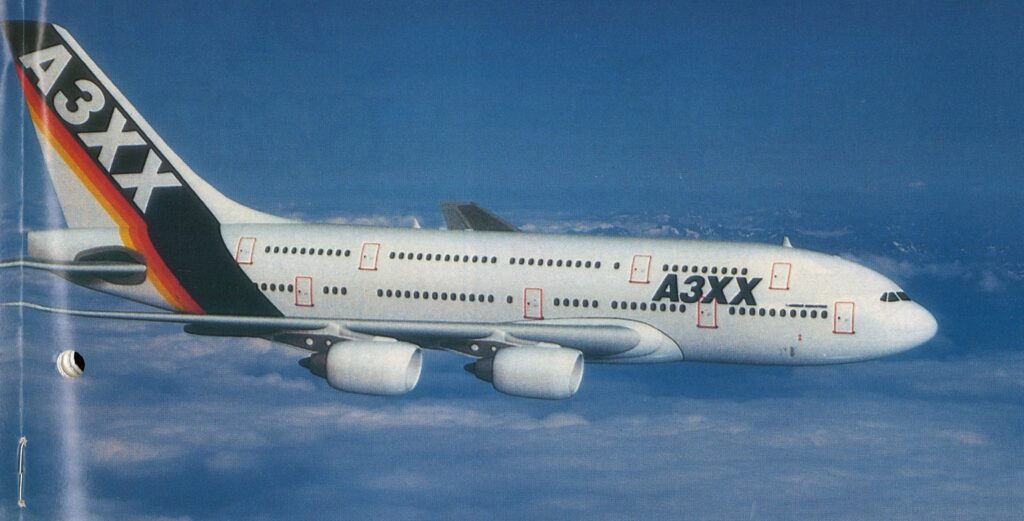
This was also the year the European Union decided to crack down on noise at airports, with hubs in January ordered to follow an EU directive that restricted aircraft type and noise at night. In March, DHL’s Boeing 727Fs were banned from Nuremburg Airport. Then in May, Liege was targeted by the EU to curb its noise output.
1999
In January of this year there was further fuel on the fire over the rise of integrators when ACN reported that freight forwarders and airlines had slipped behind integrators in the race to digitalise operations.
Later in the same month, the findings of a
study revealed airlines and forwarders were battling integrators for express cargo shipment volumes.
Forwarders were also in the spotlight. One freight forwarder suggested in June that
further consolidation among forwarders was inevitable in the future as customers increasingly wanted more services from logistics companies.
The acquisition of ASG by Deutsche Post-owned Danzas the previous month was given as an example of how companies were moving into bigger groups and alliances.
Later acquisitions did indicate the growth of large businesses. UPS acquired cargo airline Challenge Air Cargo to become the largest air cargo carrier in Latin America in July, while Deutsche Post acquired forwarder AEI for $1.4bn in November.
Additionally, British cargo carrier Heavylift Cargo Airlines, which had operated a joint venture agreement with Volga-Dnepr for IL-76 and AN-124 aircraft in addition to its fleet of largely Belfast freighters, was put up for sale in March by Norwegian owner Kvaener after 20 years of operations. It was
eventually acquired in a management buy-out.
2000
Notable deals in 2000 included the acquisition of Circle by Texas-based Eagle Global Logistics in July for $543m, and Menzies Aviation Group’s August takeover of the global airport ground handling operations of Ogden Aviation in the US for $117.8m.
Panalpina acquired logistics consultancy Avalog in February, while in October Deutsche Post announced it would increase its stake in DHL International to a majority 51%.
Meanwhile, internet cargo ventures, for example the Global Freight Exchange online marketplace pilot programme for airlines and forwarders that was launched in February, were being treated with both enthusiasm and trepidation. There was some concern that online marketplaces were a threat to the industry, as highlighted by ACN in August.
Some technology advances were undeniably progressive, though, such as the launch of a paper air waybill featuring a two-dimensional barcode in July.
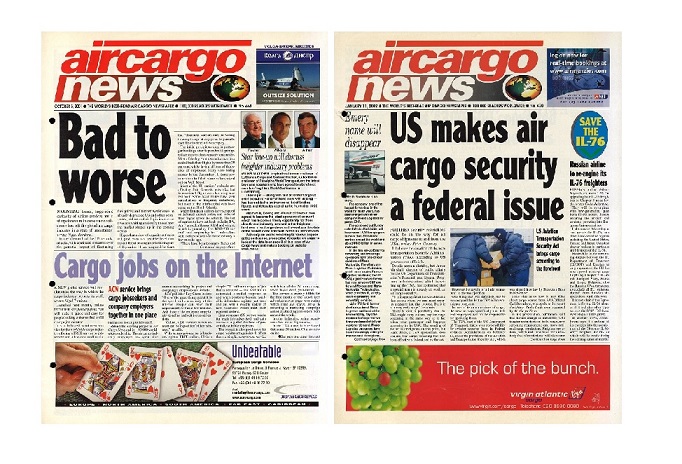
2001
UPS demonstrated its market power in January 2001 when it ordered 60 A300-600 widebody freighters at a cost of $6bn, following an order for 30 aircraft in 1998.
In April, Boeing revealed plans for its B777XF – with 90- to 100-tonne capacity.
Elsewhere, Luxembourg-based DC-8 operator Cargo Lion went bankrupt with about $12m in debts in June and Atlas Air finalised a deal to acquire Polar Air Cargo from GECAS (General Electric) for $84m in November, in what was perceived as a move to diversify from the ACMI business.
With concerns about overcapacity and reduced rates already afloat in August, the market was constrained further by the September 11 terrorist attacks on the US, which saw aircraft temporarily grounded and the US government enact stringent security measures with more – and lengthier – checks.
Companies were told to expect delays and broken supply chains. The industry swung into action, with IATA asking its276 member airlines to review security procedures.
Financial losses, services cutbacks, high fuel prices, a drop in passenger demand, slashed capacity and the pre-existing downturn left the industry in a “state of uncertainty” said ACN in a front cover story in October.
The following month, ACN noted that US cargo players felt uneasy about the impact of new government security procedures on cargo operations, and scheduled passenger and cargo traffic fell more than 30% in September on North American routes, IATA reported.
Atlas Air was one of the airlines to suffer from the 9/11 shutdown and received $10m in compensation from the US government.
2002
In January 2002, the industry was concerned that more US air cargo shipment restrictions could be imposed, ACN reported, with the establishment of the Transport Security Administration (TSA).
Track-and-trace operations then came under threat from February, with the Federal Aviation Administration (FAA) Postflight Restriction forbidding forwarders from releasing flight number information to unknown shippers until the aircraft had departed to the cargo’s final destination.
Emery Worldwide was merged with sister company Menlo Logistics by parent company CNF in January, and in March Cathay Pacific Airways made all-cargo airline Air Hong Kong a wholly owned subsidiary by acquiring the 25% stake held by Stabilo.
Heavylift Cargo Airlines ceased trading this year, but the name returned in partnership with Air Foyle (and a separate Australian airline). Air Foyle Heavylift took over the marketing of Antonov’s fleet and announced the six-engined, 250-tonne capacity AN-225 ‘Mriya’ aircraft was ready for commercial operations in October, after acquiring civil certification the
previous year.
Air Foyle had previously said Antonov was building a second AN-225, but this aircraft never materialised.
Boeing also launched the 747-400ER freighter in June as an upgrade to the 747-400F. Dutch airline KLM became the launch customer.














